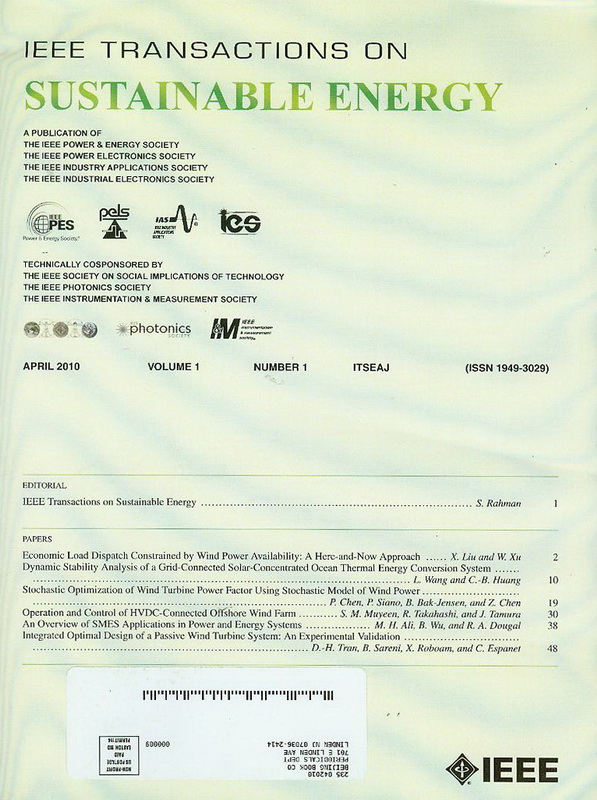Stochastic-Robust Optimal Power Flow With Small-Signal Stability Guarantee Under Renewable Uncertainties
IF 10
1区 工程技术
Q1 ENERGY & FUELS
引用次数: 0
Abstract
The diversification of power system operation modes raises the necessity of incorporating dynamic characteristics into steady-state operation. Small-signal stability is a representative issue. Though, existing frameworks either ignore the uncertainties of renewables, or only focus on the worst case. In this regard, this paper establishes a small-signal stability constrained stochastic-robust optimal power flow (OPF) model, which aims to optimize the expected cost of scheduling results with respect to the probability distributions of uncertainties while ensuring the small-signal stability requirement even in extreme scenarios. However, the synergy of uncertainties and the complicated small-signal stability mechanism significantly increase the solving difficulty. This paper proposes a comprehensive framework to overcome this challenge. First, we solve the stochastic OPF without small-signal stability constraints. For those results that do not meet the stability requirements, we use them as initial points to locate the effective boundary of the OPF feasible region where the robust small-signal stability requirement is satisfied. The effective boundary location is realized in an iterative manner. Then, in the neighborhood of this effective boundary, we construct a linear surrogate expression to represent the original robust small-signal stability constraint with Markov-chain Monte Carlo (MCMC) sampling and sample weighted support vector machine (swSVM). Finally, we solve the OPF model with the surrogate constraint. Moreover, we further propose a constraint correction strategy to guarantee the stability requirement. Case studies verify that the proposed method can acquire economical operation schemes and meet the robust small-signal stability requirement at the same time.可再生不确定性下具有小信号稳定保障的随机鲁棒最优潮流
电力系统运行方式的多样化提出了将动态特性纳入稳态运行的必要性。小信号稳定性是一个有代表性的问题。然而,现有的框架要么忽视了可再生能源的不确定性,要么只关注最坏的情况。为此,本文建立了基于小信号稳定性约束的随机鲁棒最优潮流(OPF)模型,该模型的目标是在保证极端情况下小信号稳定性要求的同时,根据不确定性的概率分布对调度结果的期望代价进行优化。然而,不确定性的协同作用和复杂的小信号稳定机制显著增加了求解难度。本文提出了一个全面的框架来克服这一挑战。首先,我们求解了没有小信号稳定性约束的随机OPF。对于不满足稳定性要求的结果,我们将其作为初始点来定位满足鲁棒小信号稳定性要求的OPF可行区域的有效边界。有效边界定位采用迭代方式实现。然后,在该有效边界的邻域中,利用马尔可夫链蒙特卡罗(MCMC)采样和样本加权支持向量机(swSVM)构造线性代理表达式来表示原始鲁棒小信号稳定性约束。最后,我们用代理约束求解了OPF模型。进一步提出了约束修正策略,以保证系统的稳定性要求。实例研究表明,该方法能够获得经济的运行方案,同时满足鲁棒小信号稳定性要求。
本文章由计算机程序翻译,如有差异,请以英文原文为准。
求助全文
约1分钟内获得全文
求助全文
来源期刊

IEEE Transactions on Sustainable Energy
ENERGY & FUELS-ENGINEERING, ELECTRICAL & ELECTRONIC
CiteScore
21.40
自引率
5.70%
发文量
215
审稿时长
5 months
期刊介绍:
The IEEE Transactions on Sustainable Energy serves as a pivotal platform for sharing groundbreaking research findings on sustainable energy systems, with a focus on their seamless integration into power transmission and/or distribution grids. The journal showcases original research spanning the design, implementation, grid-integration, and control of sustainable energy technologies and systems. Additionally, the Transactions warmly welcomes manuscripts addressing the design, implementation, and evaluation of power systems influenced by sustainable energy systems and devices.
 求助内容:
求助内容: 应助结果提醒方式:
应助结果提醒方式:


